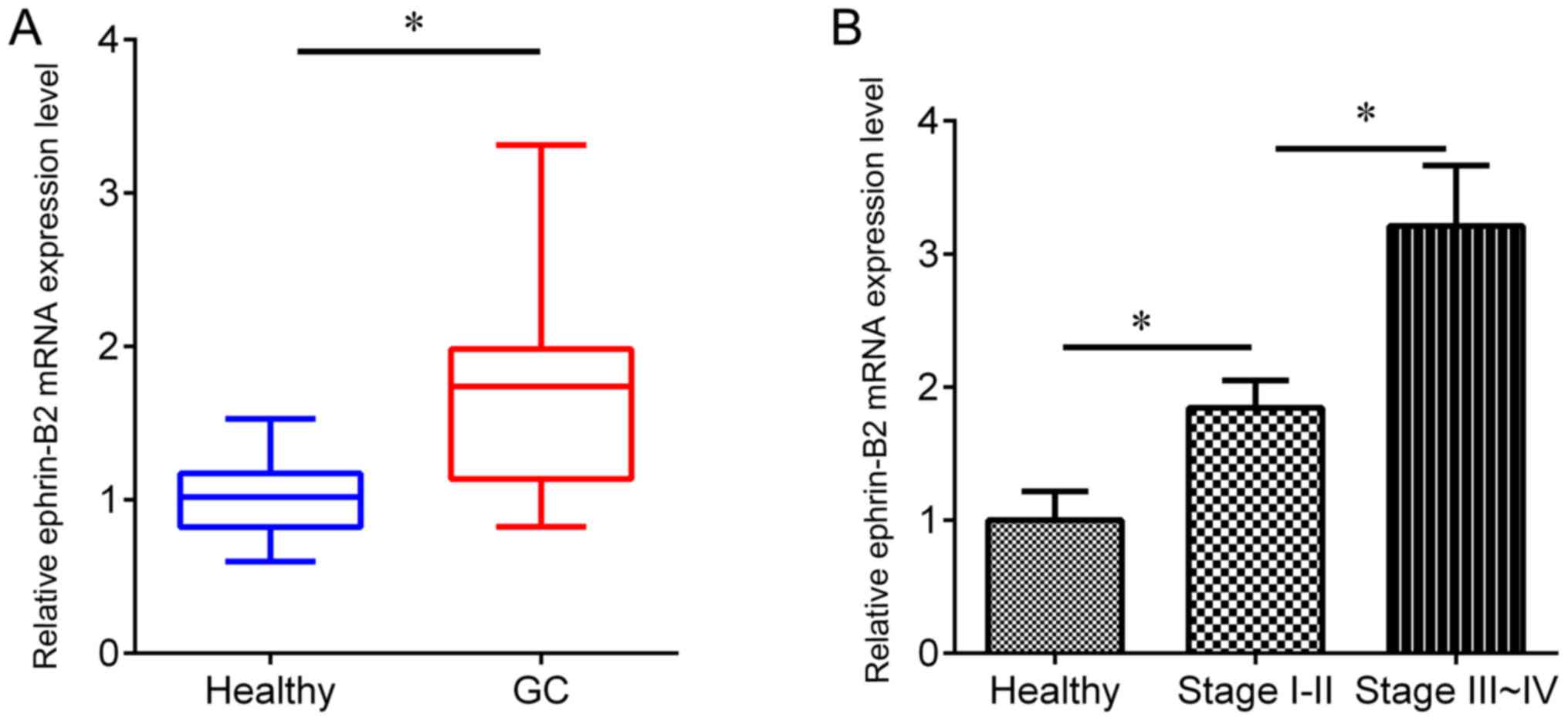|
1
|
Wang Y, Nakayama M, Pitulescu ME, Schmidt
TS, Bochenek ML, Sakakibara A, Adams S, Davy A, Deutsch U, Lüthi U,
et al: Ephrin-B2 controls VEGF-induced angiogenesis and
lymphangiogenesis. Nature. 465:483–486. 2010. View Article : Google Scholar : PubMed/NCBI
|
|
2
|
Yavrouian EJ, Sinha UK, Rice DH, Salam MT,
Gill PS and Masood R: The significance of EphB4 and EphrinB2
expression and survival in head and neck squamous cell carcinoma.
Arch Otolaryngol Head Neck Surg. 134:985–991. 2008. View Article : Google Scholar : PubMed/NCBI
|
|
3
|
Alam SM, Fujimoto J, Jahan I, Sato E and
Tamaya T: Coexpression of EphB4 and ephrinB2 in tumour advancement
of ovarian cancers. Br J Cancer. 98:845–851. 2008. View Article : Google Scholar : PubMed/NCBI
|
|
4
|
Tu Y, He S, Fu J, Li G, Xu R, Lu H and
Deng J: Expression of EphrinB2 and EphB4 in glioma tissues
correlated to the progression of glioma and the prognosis of
glioblastoma patients. Clin Transl Oncol. 14:214–220. 2012.
View Article : Google Scholar : PubMed/NCBI
|
|
5
|
Zhu XL, Chen P, Guo H, Hou WJ, Shi Y,
Zhang T, Li Q and Zhang N: Relationships among differentiation
degree, contrast-enhanced ultrasound and the expression of
Ephb4/Ephrinb2 in primary hepatocarcinoma. Hepatogastroenterology.
59:1164–1167. 2012.PubMed/NCBI
|
|
6
|
Alam SM, Fujimoto J, Jahan I, Sato E and
Tamaya T: Coexpression of EphB4 and ephrinB2 in tumor advancement
of uterine cervical cancers. Gynecol Oncol. 114:84–88. 2009.
View Article : Google Scholar : PubMed/NCBI
|
|
7
|
Krusche B, Ottone C, Clements MP,
Johnstone ER, Goetsch K, Lieven H, Mota SG, Singh P, Khadayate S,
Ashraf A, et al: EphrinB2 drives perivascular invasion and
proliferation of glioblastoma stem-like cells. Elife. 5:e148452016.
View Article : Google Scholar : PubMed/NCBI
|
|
8
|
Abengozar MA, de Frutos S, Ferreiro S,
Soriano J, Perez-Martinez M, Olmeda D, Marenchino M, Canamero M,
Ortega S, Megias D, et al: Blocking ephrinB2 with highly specific
antibodies inhibits angiogenesis, lymphangiogenesis, and tumor
growth. Blood. 119:4565–4576. 2012. View Article : Google Scholar : PubMed/NCBI
|
|
9
|
Li P, Chen W, Wang Y, Fu X, Wen K, Qian J,
Huang C and Fu Z: Effects of ephrinB2 gene siRNA on the biological
behavior of human colorectal cancer cells. Oncol Rep. 33:758–766.
2015. View Article : Google Scholar : PubMed/NCBI
|
|
10
|
Livak KJ and Schmittgen TD: Analysis of
relative gene expression data using real-time quantitative PCR and
the 2(-Delta Delta C(T)) method. Methods. 25:402–408. 2001.
View Article : Google Scholar : PubMed/NCBI
|
|
11
|
Sharma GK, Dhillon VK, Masood R and Maceri
DR: Overexpression of EphB4, EphrinB2, and epidermal growth factor
receptor in papillary thyroid carcinoma: A pilot study. Head Neck.
37:964–969. 2015. View Article : Google Scholar : PubMed/NCBI
|
|
12
|
Ozgur E, Heidenreich A, Dagtekin O,
Engelmann U and Bloch W: Distribution of EphB4 and EphrinB2 in
normal and malignant urogenital tissue. Urol Oncol. 29:78–84. 2011.
View Article : Google Scholar : PubMed/NCBI
|
|
13
|
Salvucci O, Ohnuki H, Maric D, Hou X, Li
X, Yoon SO, Segarra M, Eberhart CG, Acker-Palmer A and Tosato G:
EphrinB2 controls vessel pruning through STAT1-JNK3 signalling. Nat
Commun. 6:65762015. View Article : Google Scholar : PubMed/NCBI
|
|
14
|
Yamanda S, Ebihara S, Asada M, Okazaki T,
Niu K, Ebihara T, Koyanagi A, Yamaguchi N, Yagita H and Arai H:
Role of ephrinB2 in nonproductive angiogenesis induced by
Delta-like 4 blockade. Blood. 113:3631–3639. 2009. View Article : Google Scholar : PubMed/NCBI
|
|
15
|
Scehnet JS, Ley EJ, Krasnoperov V, Liu R,
Manchanda PK, Sjoberg E, Kostecke AP, Gupta S, Kumar SR and Gill
PS: The role of Ephs, Ephrins, and growth factors in Kaposi sarcoma
and implications of EphrinB2 blockade. Blood. 113:254–263. 2009.
View Article : Google Scholar : PubMed/NCBI
|
|
16
|
Depner C, Zum BH, Bogurcu N, Cuesta AM,
Aburto MR, Seidel S, Finkelmeier F, Foss F, Hofmann J, Kaulich K,
et al: EphrinB2 repression through ZEB2 mediates tumour invasion
and anti-angiogenic resistance. Nat Commun. 7:123292016. View Article : Google Scholar : PubMed/NCBI
|
|
17
|
Alam SK, Yadav VK, Bajaj S, Datta A, Dutta
SK, Bhattacharyya M, Bhattacharya S, Debnath S, Roy S, Boardman LA,
et al: DNA damage-induced ephrin-B2 reverse signaling promotes
chemoresistance and drives EMT in colorectal carcinoma harboring
mutant p53. Cell Death Differ. 23:707–722. 2016. View Article : Google Scholar : PubMed/NCBI
|


















